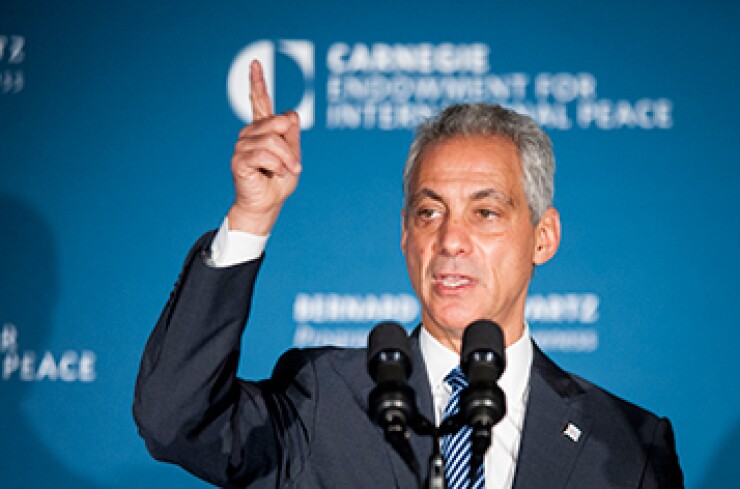
CHICAGO – An overhaul meant to save Chicago's municipal employees' and laborers' pension funds from looming insolvency won state Senate approval Monday but faces a veto threat.
Senate approval came Monday during a brief lame-duck session ahead of the new legislature's swearing in on Wednesday.
The legislation to change existing pension funding statutes for the two funds cleared the House on a 91-to-16 vote late last year during the legislature's annual veto session.
In the Senate, some Republicans joined the majority Democrats in voting 47-to-0 in favor of Senate Bill 2437, with two others voting present and 16 not voting. "With today's action, both the House and Senate have acted in a bipartisan manner to pass SB 2437, which is a responsible plan that will secure the retirements of city employees and retirees while protecting Chicago taxpayers," Mayor Rahm Emanuel said in statement.
Gov. Bruce Rauner quickly threw cold water on Emanuel's victory with a veto threat.
"The bill essentially authorizes another property tax hike on the people of Chicago and sets a funding cliff five years out without any assurances that the city can meet its obligations. The governor cannot support this bill without real pension reform that protects taxpayers," a statement from the Rauner administration said.
Because a new legislature is seated Wednesday, the Chicago pension legislation would require new votes if vetoed by Rauner.
"Bruce Rauner is Governor Gridlock, and he is showing why nothing gets done in Springfield," Emanuel's spokesman Adam Collins said. "Instead of spending his time figuring out how to stop us from fixing our pensions, the governor should focus on passing a budget and fixing his own."
Rauner's threat comes amid prolonged political gridlock on a state budget and pension reforms. Senate leaders unveiled a sweeping legislative package Monday to tackle the issues but it won't receive a vote for several weeks and it's unclear whether the House will back it.
Rauner has tied his support for the city's pension changes to legislative movement on state pension reforms in an attempt to pressure Emanuel to use his political muscle at the state capital. Rauner last year vetoed the city's overhaul of its other two pension funds that cover police and firefighters amid ongoing state inaction. With some Republican support, lawmakers overrode the veto.
It's unclear whether Republicans in the new session will stay behind the Chicago pension bill given the ongoing political discord over a budget. Democrats will retain their veto-proof majority in the newly installed Senate, while they lost their three-fifths House supermajority but retain a simple majority.
The legislation would put into statutory form funding scheme changes for the municipal employees' and laborers' pension funds designed to stave off the insolvency expected under the current statutory contribution formula. It puts the funds on a path to a 90% funded ratio in 2057.
After a five-year ramp of increasing city contributions, the city commits to making an actuarially based contribution. The current formula, which has allowed the funds' health to falter, is based on a multiplier tied to recent employee contributions.
The legislation allows the state comptroller to withhold city grants should payments fall short of required levels and it establishes a new tier of benefits and higher contributions for incoming employees. The contribution schedule closely mirrors plans already approved for the city's police and firefighter pension plans.
Enactment of the state law would mark the final step in putting the city's pension fixes in place.
Emanuel won City Council approval for a new water-sewer tax to fund higher contributions to the municipal fund. An emergency phone surcharge is covering higher payments to the laborers' fund. A record $543 million property tax increase approved last year is funding higher contributions to the public safety.
The plan calls for the city to pour $2 billion more into the funds over the next six years than the current $1 billion it owes under the existing formula. After 2022, the city will need to identify new revenue streams to cover actuarially based payments and improved funded ratios will take decades to achieve. Both are shortfalls attacked by critics.
The city's combined $33.8 billion of net pension liabilities have dragged its ratings down to a low in junk territory and a high of BBB-plus. Three rating agencies stabilized their outlooks on Chicago after passage of the water/sewer tax.





